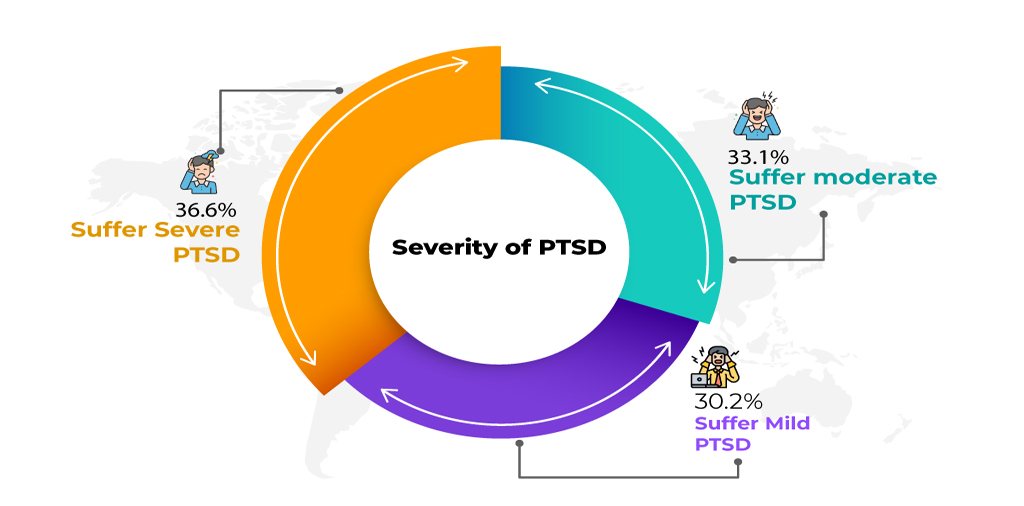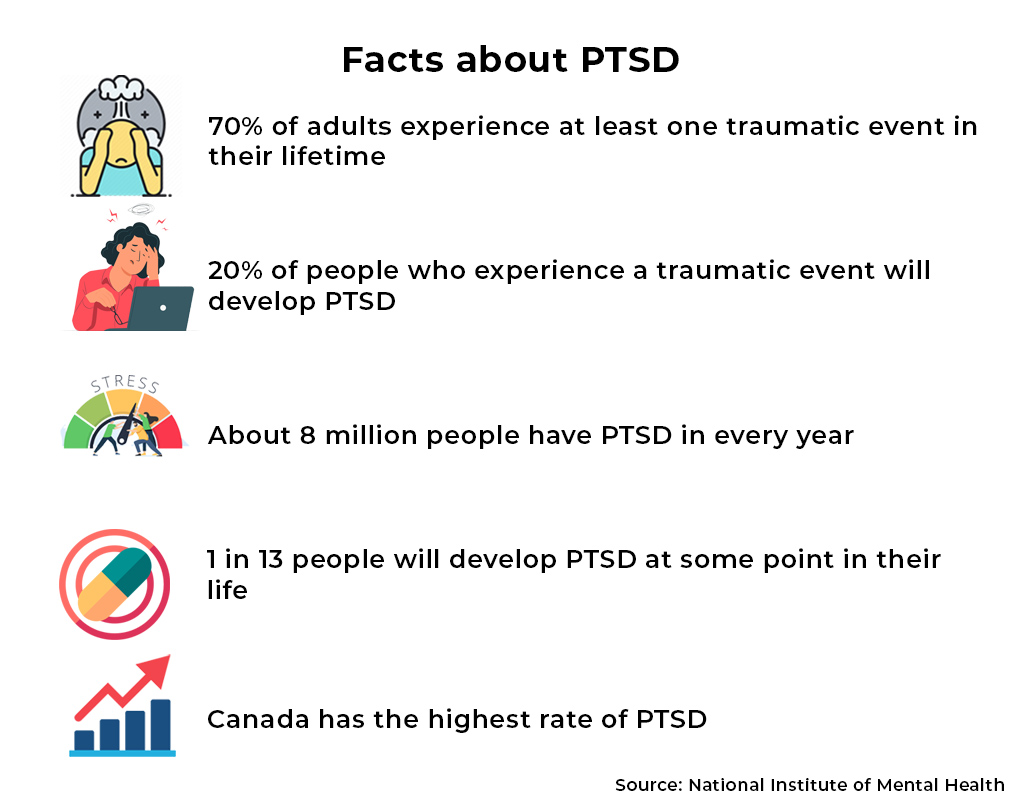How to Treat PTSD From Mindfulness
While pain, loss, and traumatic events are all a part of human experiences, the majority of us avoid discussing them. According to a Harvard Medical School study, approximately 60% of North Americans are prone to encountering one traumatic event in their entire life. Some of these individuals may acquire Post-Traumatic Stress Disorder (PTSD). PTSD is characterized by intense, distressing thoughts and sensations which are associated with traumatic experiences that persist long after a traumatic event has occurred. According to a recent assessment, Mindfulness-based Stress Reduction (MBSR) may alleviate PTSD symptoms such as insomnia, anxiety, depression, and difficulty concentrating.
Mindfulness is a way of being aware of the present moment. It helps individuals enjoy their present moment to their full potential. Mindfulness has allowed individuals to overcome anxiety, stress, and depression. It has also allowed them to overcome negative sentiments and introduce positive feelings and emotions in the mind. Additionally, mindfulness meditation has been helpful in reducing the symptoms of PTSD.
Mindfulness meditation has two main aspects:
- Being aware of the present
- Accepting incoming thoughts as they are and not changing them or judging them
Recognize and Treat PTSD
PTSD can develop as a result of experiencing or witnessing a stressful or traumatic situation. Fear activates the release of chemical reactions in the body such as cortisol and adrenaline. These flood the neurological system and activate the body’s defense mechanism. Once the body realizes the threat has passed, the nervous system typically “resets” commencing the process of healing and recovery.
In some circumstances, particularly when stress hormone is present in the body, the system does not reset. The physical and psychological repercussions of acute and extended stress appear as traumatic stress symptoms. Perhaps, not everyone who survives a traumatic event develops post-traumatic stress disorder PTSD and not everyone who has PTSD has witnessed or experienced a life-threatening event. Sudden, unexpected death or loss, or a continuous environmental threat can also trigger post-traumatic stress disorder in a person. However, for some individuals, PTSD might be accompanied by severe despair, anxiety, panic, and suicidal thoughts

PTSD Symptoms
Although there are several; origins of trauma, individuals who suffer from PTSD share a great deal in common. According to ADAA, individuals who suffer from PTSD have these common symptoms.
- Attempting to recreate or re imagine the experience - Most individuals suffer from intrusive memories or nightmares that are accompanied by physical symptoms such as a racing heart or shortness of breath.
- Avoidance - Additionally, individuals also prefer to avoid objects, places, and situations that evoke those memories.
- Hyperactivity - When unresolved nervous system hyperactivity is combined with emotional turmoil, tension, anger, and other sentiments, difficulties arise in coping with everyday tasks. This is frequently accompanied by problems sleeping, eating, as well as feeling unhappy, despair, social isolation, and lack of confidence.
Other than the above-mentioned symptoms, the following are some symptoms present in individuals with PTSD.
- They are stuck in a phase
- May experience memory problems
- Have a tendency to become an alcoholic
- May feel emotionally numb
- Are not interested in any activity
- Have negative changes in thoughts
- Experience flashback of the traumatic event
- May feel hopeless about the future
- Have difficulty maintaining relationships
- Experience severe emotional turmoil
- May resort to the easy way out such as drugs
- Go through reoccurring, unwanted upsetting memories of a traumatic event
- May have physical reactions to anything that remind individuals about the traumatic event
How Mindfulness Meditation Treats PTSD
Historically, cognitive psychotherapy was the first line of treatment for PTSD. However, many people who suffer from PTSD avoid therapy owing to social stigma, financial constraints, guilt, humiliation, or an inability to seek help. As a result of the growing need for alternative treatment options, more physicians and trauma survivors are turning to mindfulness-based meditation.
According to some studies, increasing one’s mindfulness may help people cope better with intrusive thoughts and memory and be more ready to deal with emotional pain.
Other studies concluded that individuals suffering from PTSD due to natural disasters, sexual assault, or firefighters had fewer onset of symptoms with mindfulness-based meditation. Another study conducted trials of reducing the symptoms of PTSD through mindfulness-based therapy and other controlled groups. It revealed that individuals experiencing mindfulness meditation had a significant reduction in PTSD symptoms than the control group. It was also concluded that the higher the duration of mindfulness meditation, the lower the symptoms of PTSD.

How Mindfulness-Based Therapies Might Alter the Structure of the Brain
Brain studies provide another intriguing path of research that aids us in better understanding how mindfulness-based therapies help in trauma recovery. In one study, 23 male Iraq and Afghanistan combat veterans were randomly assigned to a Mindfulness-Based Exposure Therapy (MBET) group that combines mindfulness-based therapy. It also assigned Present Centered Group Therapy (PCGT) which promotes acceptance of thoughts and emotions as they occur in the present moment.
The before and after MRI brain scans revealed that those receiving MBET had significantly more connections in the part of the brain associated with mind wandering. This means that mindfulness meditation may assist individuals suffering from post-traumatic stress. It is more effective in lessening the vicious cycle of negative thoughts, feelings, and memories associated with the condition. The participants in the MBET group also reported fewer symptoms of post-traumatic stress. In addition, it was discovered that meditation improves physical and mental health and alters the structure and function of part of the brain responsible for decision making.
Conclusion
After experiencing a traumatic event, many individuals face symptoms similar to PTSD. For instance, they become unable to stop themselves from thinking of what had happened. They go through fear, anxiety, anger, and depression which are all results of a traumatic event. However, the majority of the individuals heal with time and do not develop PTSD.
Getting help timely may aid in preventing reactions to stress or developing PTSD symptoms. Mindfulness meditation has been beneficial for many mental and physical health problems. It was only recently discovered that mindfulness is effective in reducing the symptoms of post-traumatic stress disorder. There are many people around the world suffering from post-traumatic stress disorder. The disorder hinders their capability to perform day-to-day tasks effectively. Some people may not understand what PTSD patients go through every day. Therefore, it is essential that we create awareness and help individuals to seek help.
Read more: Improve Mental Health Through Various Meditation Techniques



